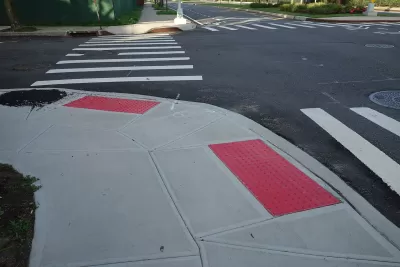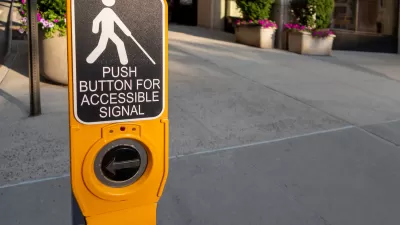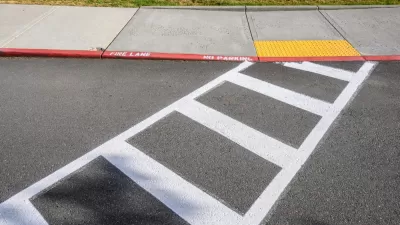Local agencies will soon be tasked with adhering to federal right-of-way accessibility rules: comprehensive guidelines for accessible streets and sidewalks.

Federal officials will take action to enforce Public Right-of-Way Accessibility Guidelines (PROWAG), a set of standards for accessible streets that remain widely absent on many U.S. streets. According to Don Kostelec, "The United States Access Board develops them as guidelines, but it takes official action by the federal government to turn them into federal standards."
"PROWAG provides a more relevant application of accessibility requirements to street settings than the current standards known as the ADA Accessibility Guidelines, commonly called ADAAG." In contrast with ADAAG, which applies more effectively to buildings and public facilities, PROWAG provides guidance for streets and sidewalks, but remains a draft document that agencies are not mandated to follow. For Kostelec, "This is why making PROWAG the official standard represents a long-awaited shift in the tectonic plates of ADA policy."
However, Kostelec warns that even if PROWAG becomes law, it will take a long time to ensure compliance by local agencies. "All of this means that, even when made the standard, the public will be reliant on pressuring many federal, local, and state agencies to make PROWAG their own."
FULL STORY: Feds Adopt Better Street Accessibility Guidelines — But Will They Make a Difference?

Planetizen Federal Action Tracker
A weekly monitor of how Trump’s orders and actions are impacting planners and planning in America.

Congressman Proposes Bill to Rename DC Metro “Trump Train”
The Make Autorail Great Again Act would withhold federal funding to the system until the Washington Metropolitan Area Transit Authority (WMATA), rebrands as the Washington Metropolitan Authority for Greater Access (WMAGA).

DARTSpace Platform Streamlines Dallas TOD Application Process
The Dallas transit agency hopes a shorter permitting timeline will boost transit-oriented development around rail stations.

The Tiny, Adorable $7,000 Car Turning Japan Onto EVs
The single seat Mibot charges from a regular plug in about as much time as an iPad, and is about half the price of an average EV.

Supreme Court Ruling in Pipeline Case Guts Federal Environmental Law
The decision limits the scope of a federal law that mandates extensive environmental impact reviews of energy, infrastructure, and transportation projects.

Texas State Bills to Defund Dallas Transit Die
DART would have seen a 30% service cut, $230M annual losses had the bills survived.
Urban Design for Planners 1: Software Tools
This six-course series explores essential urban design concepts using open source software and equips planners with the tools they need to participate fully in the urban design process.
Planning for Universal Design
Learn the tools for implementing Universal Design in planning regulations.
Roanoke Valley-Alleghany Regional Commission
City of Mt Shasta
City of Camden Redevelopment Agency
City of Astoria
Transportation Research & Education Center (TREC) at Portland State University
US High Speed Rail Association
City of Camden Redevelopment Agency
Municipality of Princeton (NJ)





























